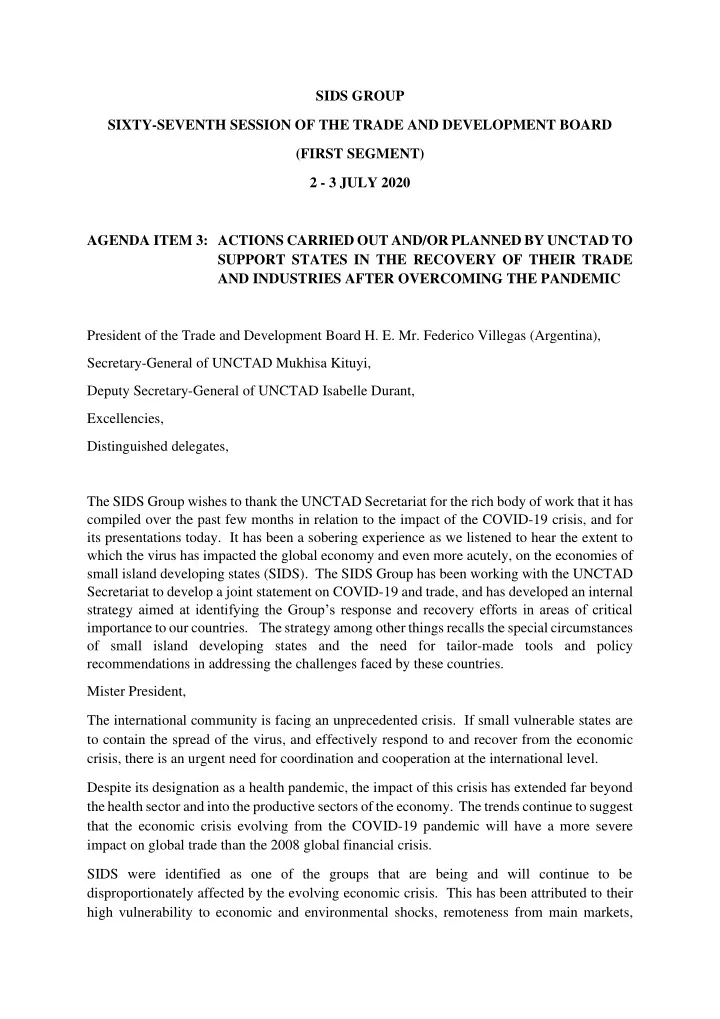

SIDS GROUP SIXTY-SEVENTH SESSION OF THE TRADE AND DEVELOPMENT BOARD (FIRST SEGMENT) 2 - 3 JULY 2020 AGENDA ITEM 3: ACTIONS CARRIED OUT AND/OR PLANNED BY UNCTAD TO SUPPORT STATES IN THE RECOVERY OF THEIR TRADE AND INDUSTRIES AFTER OVERCOMING THE PANDEMIC President of the Trade and Development Board H. E. Mr. Federico Villegas (Argentina), Secretary-General of UNCTAD Mukhisa Kituyi, Deputy Secretary-General of UNCTAD Isabelle Durant, Excellencies, Distinguished delegates, The SIDS Group wishes to thank the UNCTAD Secretariat for the rich body of work that it has compiled over the past few months in relation to the impact of the COVID-19 crisis, and for its presentations today. It has been a sobering experience as we listened to hear the extent to which the virus has impacted the global economy and even more acutely, on the economies of small island developing states (SIDS). The SIDS Group has been working with the UNCTAD Secretariat to develop a joint statement on COVID-19 and trade, and has developed an internal strategy aimed at identifying the Group’s response and recovery efforts in areas of critical importance to our countries. The strategy among other things recalls the special circumstances of small island developing states and the need for tailor-made tools and policy recommendations in addressing the challenges faced by these countries. Mister President, The international community is facing an unprecedented crisis. If small vulnerable states are to contain the spread of the virus, and effectively respond to and recover from the economic crisis, there is an urgent need for coordination and cooperation at the international level. Despite its designation as a health pandemic, the impact of this crisis has extended far beyond the health sector and into the productive sectors of the economy. The trends continue to suggest that the economic crisis evolving from the COVID-19 pandemic will have a more severe impact on global trade than the 2008 global financial crisis. SIDS were identified as one of the groups that are being and will continue to be disproportionately affected by the evolving economic crisis. This has been attributed to their high vulnerability to economic and environmental shocks, remoteness from main markets,
dependence on a few advanced markets for imports and exports, high dependence on trade, narrow production base and high levels of indebtedness. SIDS continue to merit special consideration owing to the unique circumstances confronting them not least of which is the impact of external shocks on their economies. The evolving global economic crisis caused by the COVID-19 pandemic is but one example of such shocks. Mister President, many SIDS depend on tourism as the single greatest source of revenue, employment and livelihood, with many other sectors relying directly, or indirectly on this important services sector. The closure of borders and restrictions on travel in an effort to confine the spread of the disease have therefore resulted in tourism being one of the most negatively impacted services sectors. The immediate impact of the crisis has therefore seen the closure of hotels and restaurants owing to the absence of tourists, and the disappearance of domestic markets for small farmers, and agro-processors that would supply these with no alternate markets. Over the past few months, the international community mobilised funding through a number of international and regional institutions. However, owing to stringent graduation criteria, a number of vulnerable SIDS, who require such assistance, have been omitted from accessing such resources. There is a real and pressing need for a special dispensation for all SIDS to have access to these types of financing given their high vulnerability to economic and environmental shocks. We therefore call on international institutions to re-examine their eligibility criteria to ensure that vulnerable SIDS have access to concessional financing and grants. While the attention of the international community will be concentrated on global and national efforts towards the response to, and recovery from the COVID-19 crisis, we must remain cognizant that after the crisis dissipates, climate change will remain a major challenge for SIDS, yet still with no hope of surmounting it. It is therefore important that the nexus between climate change and trade and natural disasters and trade be addressed in parallel with efforts towards the response and recovery from the COVID-19 pandemic. Mister President. The maintenance of agriculture supply chains and preservation of food security is critical, particularly as a number of SIDS remain dependent on the importation of most of their food supplies. The imposition of a growing number of export restrictions and prohibitions as a result of the COVID-19 pandemic, particularly on agricultural products, is therefore one of the immediate challenges facing SIDS. These measures, though permissible under certain circumstances in international trade rules, threaten to disrupt agricultural supply chains and limit access to adequate amounts of food in countries that are dependent on the importation of the majority of their food, including a vast majority of SIDS. We therefore strongly urge countries to consider the impact of their measures on the food security of net-food importing small island developing states and to reverse any unnecessary trade-distorting measures instituted in the name of the COVID-19 pandemic. Small island developing states are amongst the most highly indebted countries in the world. If crisis-stricken small island developing states are to be in a position to free up resources to cope
with and recover from the crisis, and avoid a vicious cycle of indebtedness, it is crucial that international institutions institute temporary automatic standstills in debt payments. Mister Chairman, The SIDS Group will continue to work with UNCTAD in the evolution of our COVID-19 response and recovery efforts.
Recommend
More recommend